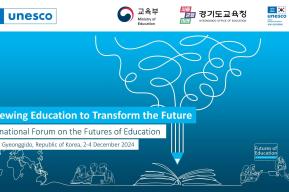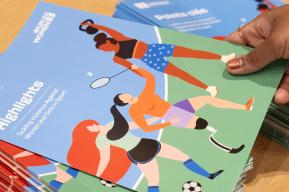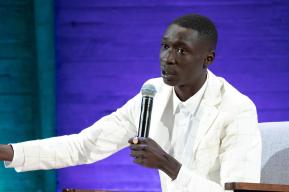According to the UN Refugee Agency, UNHCR, Lebanon remains host to over 1.5 million refugees from the Syrian Arab Republic and elsewhere – the highest number of refugees per capita of any country in the world. Consequently, the country relies on workable solutions to ensuring refugees have access to basic services such as health, housing and education.
Regarding the latter, a UK-based charity called the Education Development Trust (EdDevTrust) has developed an innovative programme to educate refugee children. Its English Language Course for Refugee Teachers (ELCRT) provides training for teachers, who are themselves refugees, to instruct refugee children in English, numeracy and science, using English as the primary language of instruction.
This notable initiative is one of the best-practice case studies featured in an upcoming publication by the UNESCO Institute for Lifelong Learning (UIL), From Radio to Artificial Intelligence: Review of Innovative Technology in Literacy and Education for Refugees, Migrants and Internally Displaced Persons.
Omran Al Sarhan, a 31-year-old teacher from the Syrian Arab Republic, is one of the beneficiaries of the ELCRT programme, which he credits with giving him the confidence to speak English.
My life has changed for the better since I started the course. It has enabled me to use the language without hesitation or fear. I learned a lot from the teacher-trainers – they motivated us to talk and express our opinions. I also received continued support from my teacher even outside of school hours, answering all the questions I had.
Working with several NGO partners in the country, EdDevTrust’s ELCRT programme provides training for teachers such as Mr Al Sarha, who are themselves Syrian refugees, so they can instruct refugee children in English, numeracy, and science, using English as the primary language of instruction and prepare them to enrol in the Lebanese school system. Believing that ‘everyone’s life can be transformed through excellent education’, EdDevTrust and its partners developed ELCRT to serve as a model for other NGOs to replicate with refugee populations across the world.
Overcoming the challenges
Learners enrolled to the ELCRT programme are teachers who wish to improve their teaching skills and are identified and selected by EdDevTrust in consultation with its NGO partners, Jusoor, Sawa for Development and Aid, Out of the Wilderness, Multi Aid Programs (MAPS) and Save the Children.
Many teacher-learners who sign up for the programme have little to no knowledge of English, so the programme aims to strengthen language skills while also providing instruction on pedagogical techniques. Learners also face the challenge of juggling the responsibilities of the course with teaching their own classes throughout the country, some in very remote areas. This challenge was heightened by the outbreak of the COVID-19 pandemic: for the academic year of 2019/20, for example, only 88 of the 106 teacher-learners who signed up for the ELCRT programme managed to complete it.
The programme
We ensure to not only recruit teachers who can, for example, teach English, but who have the ability to demonstrate modelling teaching strategies, which is what sets this programme apart.
The Lebanon-based teacher-trainers are hired by EdDevTrust and are required to have obtained a bachelor’s degree in education or English and preferably further certification, such as the Certificate in English Language Teaching to Adults (CELTA). They also receive further support from EdDevTrust through conferences and online courses on teaching skills, particularly for teaching English to adults, and teaching English as a second language.
As teachers we’re not just focused on delivering the programme, but we observe, measure and assess the impact on an ongoing basis to sharpen our own skills and to ensure our programmes are evidence- and research-based. In doing so, student engagement levels are very high. We also gain a lot of training – we call on experts and attend various conferences on a variety of subject matters beyond teaching English, such as relating to diversity and inclusion, health and safety training, etc.
To enhance the remote learning experience, ELCRT also used widely available and familiar ICT tools, selected based on accessibility and connectivity in terms of bandwidth and affordability. WhatsApp groups emerged as a critical tool, as most learners were already familiar with the platform and the teachers were able to directly communicate with the learners to send them homework assignments and corrections. Teachers were also able to better interact with the learners and encourage them to practise their English using a combination of written and voice messages, images and video clips (for example, learners were asked a question on the group chat, which they answered by recording themselves and submitting their response).
Omran Al Sarhan was highly motivated to help children obtain their right to education and did not let the pandemic faze him. While he found the transition to online learning a challenge, especially because of unreliable electricity and internet connection, he acknowledges the power of technology, noting that ‘COVID-19 had a huge impact on the learning process, especially due to the transition from offline learning to online. But technology, barring the internet and electricity issues, has provided the ability for a wide range of people to access the classes. It has also helped with communication with other people.’
When teaching online, it’s imperative teachers have some technological literacy. We have to become creative in our approach to learning as well when we move from text to online. Instructions need to be clear, concise and correct, as you’re not able to drill as much information as you can in a face-to-face classroom. When teaching online, we need to sharpen our time management and problem-solving skills to ensure students are engaged.
Other challenges teacher-trainers faced included teacher-learners not having access to adequate technology to enable students to learn. ‘We have experienced many problems relating to students not having access to electricity to charge the many digital devices they require to complete the course,’ explains Ms Matta. ‘To counter this, we designed our lessons using mobile devices, as almost all students would have access to a mobile. We then had to adapt the programmes to mobile, which presented another challenge.’ ELCRT also supported the students with fees for internet usage.
Learning model
The ELCRT programme provides learners with 30 hours of instruction, comprising of 20 sessions lasting 90 minutes each, with courses including ‘Literacy and digital skills in a multilingual context’, ‘Literacy for social, cultural and economic integration’ and ‘Vocational education’. They learn teaching strategies and pedagogical approaches that teacher-learners can use in their own classrooms, while simultaneously improving their English language skills. Each group of learners is given a weekly assignment requiring around 10 hours of work per session. Upon the successful completion of the course, the learners receive a formal certificate, attesting their language skills.
Learners are guided in using the flipped classroom approach (whereby videos, PowerPoint presentations or similar are sent to participants ahead of the lesson for discussion in the session) and presentation-based teaching. Using blended learning techniques that combine in-person and virtual instruction, learners are taught to use technology as a tool for instruction. Learners who are initially unfamiliar with the technology build their own digital competences while learning how to integrate such tools into their lessons.
The impact
In the academic year of 2019/20, 88 teacher-learners participated in the programme, from 15 different schools who teach 1,500 children. Through a robust internal data collection and assessment in the evaluation period of 2018/19 and verified observations by EdDevTrust, it emerged that teacher-learners reported using English more frequently in their lessons. This further enabled their own students to understand English better and use it more. Highlighting the success of the programme, Ms Deeb Atallah said that EdDevTrust ‘conducted an end-of-programme survey and were amazed to receive the highest satisfaction results and response rate from teachers in four years, which was testament to the success of the online course.’
Furthermore, most teacher-learners reported that their training had adequately prepared them to implement the curriculum, with self-reported data indicating that 95 per cent of the participants were satisfied with the quality of professional development provided, and 98 per cent of participants felt that the course had improved their confidence in listening and speaking. Remarkably, 100 per cent of participants reported an improvement in the level of English language used in their classrooms.
A senior project manager at EdDevTrust further highlighted that ‘in the makeshift classroom in Lebanon, where the state system is at capacity, alternative school settings are flourishing and the appetite to learn – and to teach – is as strong. Our language courses for teachers, customised to meet the needs of the teachers working in non-formal education, many of whom are refugees themselves, are welcomed with open arms. The teachers want to continue their mission to teach, they want to help pave a way out of the situation they find themselves in and they want to ensure that generations aren’t lost.’
While EdDevTrust reported that data collection during the pandemic proved challenging, based on the past reports it is nevertheless clear that the programme has the potential to have a strong impact educationally and socially in Lebanon and beyond.









